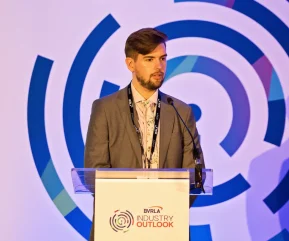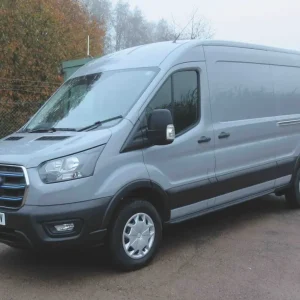
Makers of electric vans are not admitting flaws with their vehicles’ specs, it has been said, amid ongoing questions over the UK Government’s ZEV mandate.
The mandate requires manufacturers to sell an increasing proportion of zero-emission vans each year, or face fines.
The government is planning a consultation soon on potential revisions, following a recent meeting with industry representatives, including the BVRLA.
Speaking at the rental and leasing industry body’s Industry Outlook conference, its director of policy and public affairs Thomas McLennan (pictured) said that issues described by fleets with electric vans currently on the market were not being fairly reflected in manufacturers’ representations.
He said: “To government, OEMs will not admit that their product isn’t right.
“In the [BVRLA’s] Industry Outlook report there are some fairly strong views from members around the flexibility of product. When you talk to the manufacturers in forums with government, there is no admission there. [They say] ‘The product is right, the market is weak’.
“In the initial construction of the ZEV mandate we wanted vans to have a minimum range to get credits of well beyond 100 miles. There was very strong pushback from OEMs on that, because they wanted to make sure that they could get as much compliant product as they could.”
When asked if the government’s dates for electric van sales targets could be pushed back, McLennan suggested that there was not “the same energy” from the government to impose new electric van sales by 2030 as by 2035.
He continued: “If you’re talking about vans being 2040 or something further back, that starts getting into a much more complicated discussion, because we’ve got two sides of the same point. Folks say ‘we want certainty’, but at the same time try to change the dates.
“From the perspective of wanting certainty, we need to set a trajectory and really try and stick to it, like once this phase of discussion is over, then I think there’s a very interesting point whether or not OEMs will just get behind it to try and make it happen, or will they continue to flag challenges?”
Also speaking at the conference, United Rental Group CEO Per Vogerl said: “Manufacturers don’t want the [ZEV mandate] percentages to change. They would be happy to change fines, but they clearly want that certainty because of their production.
“What I heard from the meeting led by the Department for Transport, the consent was European manufacturers do not want to buy credits from the Chinese [manufacturers].
“And I get it. I would rather pay a fine to the government than pay my competitor. I would even pay more fine, than pay any money to my competitor.”
Also speaking at the conference, Cap HPI senior editor for commercial vehicles and motorcycles Dionne Hanlon said electrification was proving more suitable for some sections of the van market than others.
She said: “I think it’s worth remembering that in certain cases EVs do work. Small and medium vans have got perfectly good ranges now, and we’ve actually seen [more] registrations in the last month or two in that sector.
“The place it doesn’t work and might need kicking down the road is large vans. I’ve driven a large van from Leeds to Hull, and it was suppose to have 180 miles of range, and I barely got there, and then I couldn’t get in a charging bay. So there’s other obstacles that large vans face.”





